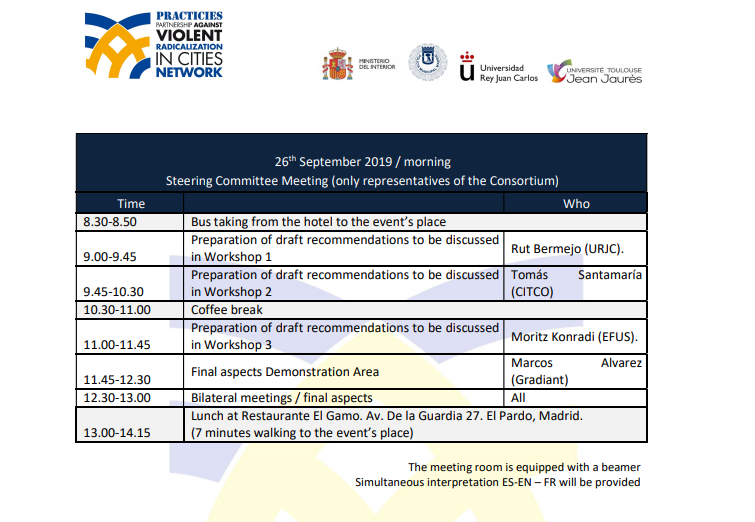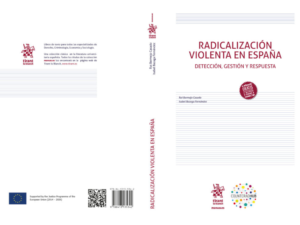
Publications
“What do responses to COVID-19 and violent extremism have in common?” Rut Bermejo (2020)“COVID-19 and violent extremism are, on the surface, two completely unrelated phenomena. However, both are directly affecting the security and lives of individuals, society and culture. Moreover, both have been responded to in many similar ways” (Bermejo, 2020).
637 Downloads“Digital Immigrants among Migrant Women in Spain” Rut Bermejo and José Manuel Sánchez-Duarte (2019)Digital technologies are a reality all over the world. Both migrants and non-migrants use and rely on technologies (smartphones, internet, digital networks) to organise their lives, connect with family and friends, and develop their skills and job prospects. Through the life stories of migrant women settled in Madrid, our study seeks to understand their use of Information and Communication Technologies (ICTs) and the impact of these technologies on their lives. Age, or generation, seems to be the most important factor in the differences observed among immigrant women who are also digital immigrants.
Rut Bermejo et Jose Manuel Sánchez-Duarte, “Digital Immigrants among Migrant Women in Spain”, Socio-anthropologie [En ligne], 40 | 2019, mis en ligne le 08 janvier 2020, consulté le 04 juillet 2020. URL : http://journals.openedition.org/socio-anthropologie/6109 ; DOI : https://doi.org/10.4000/socio-anthropologie.6109
371 Downloads PRACTICIES Project Congress Agenda
PRACTICIES Project Congress AgendaOn 26 and 27 September, the PRACTICIES project congress will be held in Madrid, bringing together members of this project, and other European projects, whose main objective is to prevent and combat radicalisation and violent extremism.
Several members of the research team of the Observatory of Good Governance of the URJC will participate in it. Among them, Ms. Rut Bermejo, coordinator of different workshops that will take place.
862 Downloads“Violent radicalisation in Spain. Detection, management and response”: Rut Bermejo Casado and Isabel Bazaga FernándezThe team of the Observatory of Good Governance of the Rey Juan Carlos University together with numerous experts of recognised experience and prestige have written the manual “Violent Radicalisation in Spain. Detection, management and response” published by Tirant lo Blanch. September 2019.

728 Downloads1st conference of the COMMUNITY OF USERS IN SECURITY IN SPAIN (CoU Spain) WITH ACADEMYThe URJC participates in the 1st conference of the Community of Security Users in Spain (CoU Spain) with Academia will take as a basis the H2020 Work Programme “Secure Societies: Protecting the freedom and security of Europe and its citizens”, for the division into thematic areas, although the aim is to exchange information to stimulate the creation of networks and consortia. The aim is to give practitioners the opportunity to create ideas and find partners for each open research call under any European funding programme and not only H2020.
The main objective of the CoU Spain is to act as a meeting point for end users, professionals, SME representatives, research and technology organisations, academia and industry at national level. During these months, the usefulness and high expectations about the need to pursue and strengthen this community of users, an initiative that already has more than 260 members, have been demonstrated.
793 DownloadsThe activity of business promotion by Local Bodies. Situation and perspectivesPaper presented at the Conference on entrepreneurial activity and municipal competences: obstacles and possible lines of action. Faculty of Law and Social Sciences, Universidad Rey Juan Carlos, 12 April 2012.
539 DownloadsSeminar on current legal problems in society and administrationPaper presented at the Seminar on current legal problems of society and the Administration. Faculty of Communication Sciences, Universidad Rey Juan Carlos, 13 April 2010.
839 Downloads
“COVID-19 and violent extremism are, on the surface, two completely unrelated phenomena. However, both are directly affecting the security and lives of individuals, society and culture. Moreover, both have been responded to in many similar ways” (Bermejo, 2020).
Digital technologies are a reality all over the world. Both migrants and non-migrants use and rely on technologies (smartphones, internet, digital networks) to organise their lives, connect with family and friends, and develop their skills and job prospects. Through the life stories of migrant women settled in Madrid, our study seeks to understand their use of Information and Communication Technologies (ICTs) and the impact of these technologies on their lives. Age, or generation, seems to be the most important factor in the differences observed among immigrant women who are also digital immigrants.
Rut Bermejo et Jose Manuel Sánchez-Duarte, “Digital Immigrants among Migrant Women in Spain”, Socio-anthropologie [En ligne], 40 | 2019, mis en ligne le 08 janvier 2020, consulté le 04 juillet 2020. URL : http://journals.openedition.org/socio-anthropologie/6109 ; DOI : https://doi.org/10.4000/socio-anthropologie.6109

On 26 and 27 September, the PRACTICIES project congress will be held in Madrid, bringing together members of this project, and other European projects, whose main objective is to prevent and combat radicalisation and violent extremism.
Several members of the research team of the Observatory of Good Governance of the URJC will participate in it. Among them, Ms. Rut Bermejo, coordinator of different workshops that will take place.
The team of the Observatory of Good Governance of the Rey Juan Carlos University together with numerous experts of recognised experience and prestige have written the manual “Violent Radicalisation in Spain. Detection, management and response” published by Tirant lo Blanch. September 2019.

The URJC participates in the 1st conference of the Community of Security Users in Spain (CoU Spain) with Academia will take as a basis the H2020 Work Programme “Secure Societies: Protecting the freedom and security of Europe and its citizens”, for the division into thematic areas, although the aim is to exchange information to stimulate the creation of networks and consortia. The aim is to give practitioners the opportunity to create ideas and find partners for each open research call under any European funding programme and not only H2020.
The main objective of the CoU Spain is to act as a meeting point for end users, professionals, SME representatives, research and technology organisations, academia and industry at national level. During these months, the usefulness and high expectations about the need to pursue and strengthen this community of users, an initiative that already has more than 260 members, have been demonstrated.
Paper presented at the Conference on entrepreneurial activity and municipal competences: obstacles and possible lines of action. Faculty of Law and Social Sciences, Universidad Rey Juan Carlos, 12 April 2012.
Paper presented at the Seminar on current legal problems of society and the Administration. Faculty of Communication Sciences, Universidad Rey Juan Carlos, 13 April 2010.
Visit us
University Rey Juan Carlos
Paseo de los Artilleros S/N,
Office 116 classroom building.
Vicálvaro Campus (Madrid)
Contact us
914887568 – 914887893
914887887
Opening hours
Mo-Fr: 8am – 5pm
Sat/Sun: Closed
